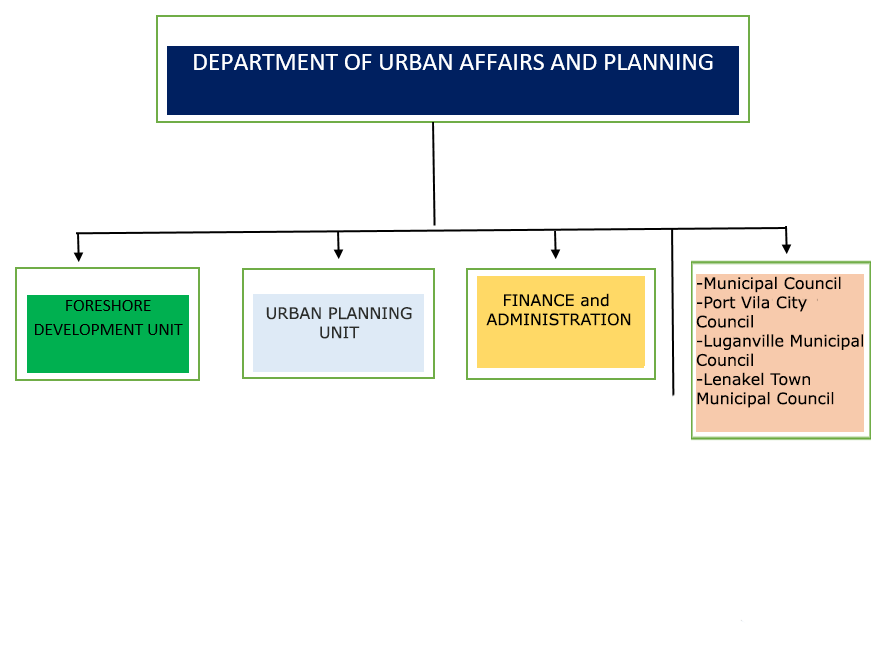The Department of Urban Affairs and Planning's structure is a detailed below:

-
Foreshore Development Unit
The Foreshore Development Unit is a unit under the Department of Urban Affairs and Planning and it is responsible to manage and implement the Foreshore Development Act CAP 90 to better regulate the developments along the foreshores in all islands in Vanuatu. Its objective is to administer and enforce the Foreshore Development Act by developing new guidelines, review and make improvements to the existing legislative frameworks and provide secretariat support to the Foreshore Advisory Committee. There are four (4) positions under this unit:
- Principal Foreshore Development Officer – plays an important role in lead to oversight the unit to effectively deliver its mandate.
- Principal Foreshore Development Officer - implements the Foreshore Development Act CAP 90 by formulating Policy guidelines, regulations, managing database system and providing sound technical advice.
- Senior Foreshore Enforcement Officer – implements the Foreshore Development Act CAP 90 by executing monitoring and evaluation of Foreshore Development legislation and enforce penalties on illegal offence throughout Vanuatu.
- Foreshore Development Officer – plays a role in assisting the enforcement of the Act and making sure that policy guidelines are implemented and regulations developed.
-
Urban Planning Unit
The Urban Planning Unit under the Department of Urban Affairs and Planning is responsible for all urban planning policies, urban strategies, urban designs and effective implementation of all urban planning policies within all urban centres in Vanuatu. It will also deal with matters concerning Housing and Informal Settlements and work with both Government and Private sector to bring investments in the housing sector.
The unit’s objectives are to improve urban planning policies, improve coordination of declared physical planning areas in collaboration with the Decentralisation Policy and strengthen the implementation of planning practices to achieve prosperous urban centres in Vanuatu.
The additional positions that are required for this unit to function effectively are :
- Principal Urban Planner – takes lead in managing the unit and into archiving its goals and objectives. This is a key role to ensure that urban planning documents including designs and policies are in place.
- Senior Urban Planning Officer – role is to formulate and maintain standardize planning legislative frameworks and monitor its implementation throughout the urban centres.
- Urban Planning Officer – assist the Principal Urban Planner and Senior Urban Planner in implementing the Physical Planning Act CAP 193 and other development controls developed by the unit.
- Senior Housing and Settlement Officer – key role is to lead and manage housing and informal settlement matters and establish legislative frameworks, investments and monitor housing and informal settlements within urban areas. This role will also work with private sectors or investors in exploring investments to improve housing in urban areas to cater for its demand.
- Senior GIS and Mapping Officer – This position’s key role is to administer Geographical Information System (GIS) of the Physical Planning Areas (PPAs) and provide mapping support once an area is declared as PPA and urban centre. GIS is an important planning tool required for planners and it is important that this tool is support within the department and continually updated to provide the required planning information.
-
Finance & Administrative
Finance & Administrative. This division is responsible for the Administration and Finance services for all Units within the Department of Urban Affairs Structure. This division consists of the Director, Senior Finance & Procurement Officer, Administration Officer and the Office Driver/ Messenger. This unit has four positions and they are as follows:
a) Director:The director’s main role is to lead and manage the department, its staff and all of the departments operations. Furthermore, the director has direct control and supervision over the finance and administration unit which includes overseeing the implementation and enforcement of the legislative framework.
b) Senior Finance and Procurement Officer:The main function of the finance and procurement office is to coordinate and manage all financial matters of the department including working with Municipalities in improving their financial management, operations and ensuring that controls are established for better financial management of municipalities. The finance and procurement officers’ role also supports the department in projects implemented.
c) Administration OfficerThe role of the administration officer is to manage all office administration task and maintain office cleanliness
d) Office Driver/ MessengerThe department needs a full-time driver to be in charge of the department vehicle, deliveries and support the team in enforcement of legislations.
-
Municipalities
Currently there are 3 main municipalities; Port Vila City Council (PVCC), Luganville Municipal Council (LMC) and Lenakel Town Municipal Council (LTMC). These municipalities once report to the Department of Local Authorities (DLA) but after the separation of the Physical Planning Unit into the new Department of Urban Affairs and Planning (DUAP), they now refer their matters and concerns to this new department.
The seconded Department staff to the municipalities are in the positions stated below:
1. Town Clerk – PVCC
2. Town Clerk – LMC
3. Deputy Town Clerk – PVCC
4. Deputy Town Clerk – LMC
5. Town Planner – PVCC
6. Town Planner – LMC
7. Accountant – PVCC
8. Accountant – LMC
9. Cashier – PVCC
10. Cashier - LMCThe Municipalities are established to govern the areas of urban state land. They are mandated to plan and manage their boundaries accordingly to provide a safe and stable urban environment for their residents. In order to do so, they must create bye-laws to better regulate and manage developments arising within their boundaries to also ensure that social and economic developments are well coordinated, properly planned, and urban policies developed are implemented to achieve better outcomes for the urban tax payers and the public.